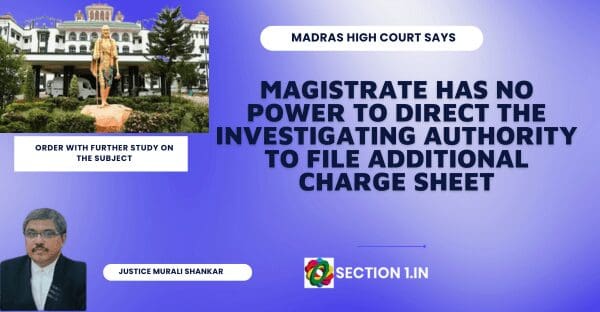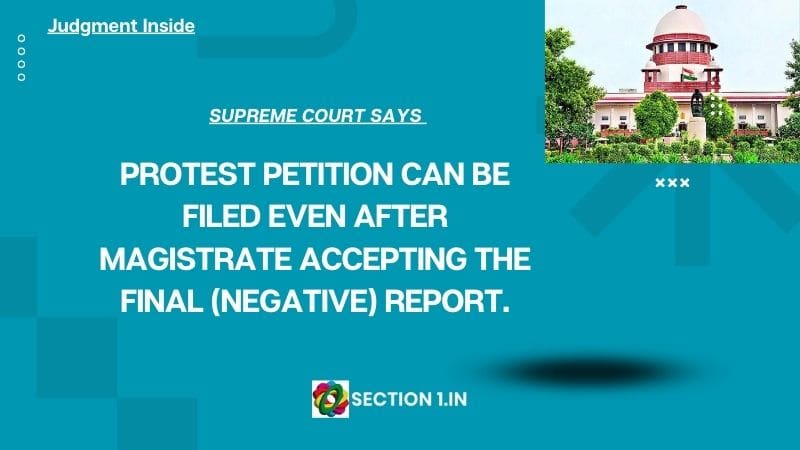Section 155 Cr.P.C – commission of non-cognizable offences
9. The High Court relied upon the provisions contained in Clause (c) and held that since the wife herself had not filed the complaint and Women’s Commission had complained to the police, the Sub Divisional Judicial Magistrate, Anandpur could not legally take cognizance of the offence. In laying down this proposition, the High Court forgot that the other offence namely, the offence under Section 498A I.P.C. was a cognizable offence and the police was entitled to take cognizance of the offence irrespective of the person who gave the first information to it. It is provided in Section 155 as under:-
“155. Information as to non-cognizable cases and investigation of such cases –
(1) When information is given to an officer in charge of a police station of the commission within the limits of such station of a non-cognizable offence, he shall enter or cause to be entered the substance of the information in a book to be kept by such officer in such form as the State Government may prescribe in this behalf, and refer, the informant to the Magistrate.
(2) No police officer shall investigate a non-cognizable case without the order of a Magistrate having power to try such case or commit the case for trial.
(3) Any police officer receiving such order may exercise the same powers in respect of the investigation (except the power to arrest without warrant) as an officer in charge of a police station may exercise in a cognizable case.
(4) Where a case relates to two or more offences of which at least one is cognizable, the case shall be deemed to be a cognizable case, notwithstanding that the other offences are non-cognizable.”
10. Sub-section (4) of this Section clearly provides that where the case relates to two offences of which one is cognizable, the case shall be deemed to be a cognizable case notwithstanding that the other offence or offences are non-cognizable.
11. Sub-section (4) creates a legal fiction and provides that although a case may comprise of several offences of which some are cognizable and others are not, it would not be open to the police to investigate the cognizable offences only and omit the non-cognizable offences. Since the whole case (comprising of cognizable and non-cognizable offences) is to be treated a cognizable, the police had no option but to investigate the whole of the case and to submit a charge-sheet in respect of all the offences, cognizable or non-cognizable both, provided it is found by the police during investigation that the offences appear, prima facie, to have been committed.
12. Sub-section (4) of Section 155 is a new provision introduced for the first time in the Code in 1973. This was done to overcome the controversy about investigation of non-cognizable offences by the police without the leave of the Magistrate. The statutory provision is specific, precise and clear and there is no ambiguity in the language employed in Sub-section (4). It is apparent that if the facts reported to the police disclose both cognizable and non-cognizable offences, the police would be acting within the scope of its authority in investigating both the offences as the legal fiction enacted in Sub-section (4) provides that even non-cognizable case shall, in that situation, be treated as cognizable.
There is no bar to include non-cognizable offence on the charge sheet where cognizable offences are found
13. This Court in Preveen Chandra Mody v. State of M.P., AIR (1965) SC 1185 has held that while investigating a cognizable offence and presenting a charge-sheet for it, the police are not debarred from investigating any non-cognizable offence arising out of the same facts and including them in the charge-sheet.
Party
STATE OF ORISSA v. SHARAT CHANDRA SAHU AND ANR -OCTOBER 8, 1996 – Crl. Apl no: 768 of 1996 = (1996) supp 7 SCR 304.
https://main.sci.gov.in/jonew/judis/14958.pdf
state of orissa vs. sharat chandra sahu – charge sheet in non-cognizable offences
Further study
- SECTION 154 Cr.P.C – POLICE HAS NO OTHER OPTION EXCEPT TO REGISTER FIR IF COGNIZABLE OFFENCE(S) FOUND. MAGISTRATE MUST DIRECT INVESTIGATION IF COGNIZABLE OFFENCE FOUND IN THE COMPLAINT.
- Cr.P.C., 1973. Notes no.8: Procedure for registration (Chapter XII – Part.2)
- WHETHER SEXUAL INTERCOURSE BETWEEN A MAN AND HIS WIFE BEING A GIRL BETWEEN 15 AND 18 YEARS OF AGE IS RAPE?
- Basic understanding: A common knowledge in types of crimes and in perspective of Indian criminal laws
- PMLA – ALL THE OFFENCES UNDER THE PMLA ARE COGNIZABLE AND NON-BAILABLE






